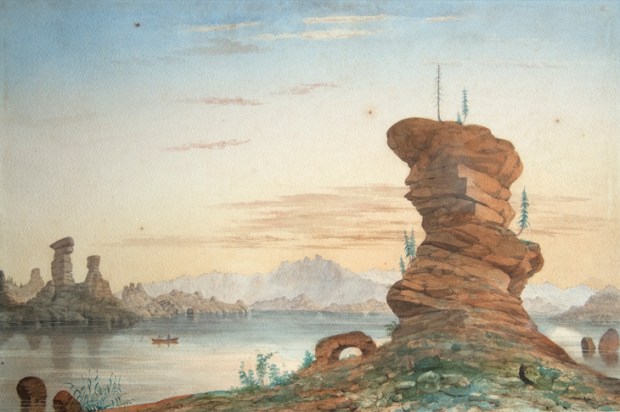China, wrote Adam Smith, is ‘one of the richest, that is, one of the most fertile, best cultivated, most industrious and most populous countries in the world’. It was an obvious exemplar for a man who was trying to write An Inquiry into the Nature and Causes of the Wealth of Nations. In the late 18th century, when Smith published his seminal work, Britain had not only already begun to build an empire; it was about to learn from the experience of losing parts of it too, as the colonies in North America detached and went their own way.
Despite the shock of the US Declaration of Independence — in the very same year that The Wealth of Nations was published — it was Asia that was much more important, lucrative and interesting than the Americas to the British. Asia was the source of spices and silks, gold and jewellery; it promised great rewards for those willing to head east and with a sufficiently ruthless streak not to let anyone stand in the way of their fame and fortune.
To start with, those who gazed at China did so with admiration, noting — like Smith — its order, sophistication and wealth. Although there was plenty of demand for products from all over Asia, the British became addicted to one commodity in particular. Described by Peter Mundy in the 17th century as a drink ‘which is only water with a kind of herbe boyled in it’, tea soon took over polite society.
As Stephen Platt writes in this entertaining and well-paced book, imports rose from 250,000 lbs in 1725 to some 10 million lb by the early 1800s — a rise of 10,000 per cent. It became so lucrative that, by that time, it represented two-thirds of the revenue of the East India Company, and was so important that the government in London ordered that a year’s supply be held in reserve.
The question was what to sell in order to get access to the green gold — and the other goods and commodities that China had to offer, such as copper, porcelain and raw silk. Efforts to create a global Britain, based on trade, did not go well. May you live for ‘tens of thousands of thousand years,’ wrote George III to the Qianlong Emperor. No one was impressed. ‘We possess all things,’ he was told, ‘set no value on objects strange or ingenious, and have no use for your country’s manufactures.’
This prompted a change in the way China was viewed from Europe. By refusing to open their doors to trade, the Chinese showed all ‘the characteristic pride of semi-barbarians,’ too stupid to understand what was good for them. The answer was to force the doors of trade open; and the best way to do that, it soon emerged, was the sale of vast quantities of opium. Global Britain was built as a narco-empire; and as to be expected, those controlling the drugs trade were ruthless in the promotion of business, the expansion of interests and the methods used to protect them.
As Platt tells it, opium was well known for its addictive qualities, the drug leading into an ‘abyss of divine enjoyment’, in the words of Thomas De Quincey. The opium trade produced huge profits and caused great concern in China. The number of users grew ‘day by day’, noted one emperor, ‘destroying our resources and harming our people. Every day ‘is worse than the last’.
Efforts to curtail the drug trade were plagued by the concern of Chinese thinkers and policy-makers. It irked some that ‘opium is a poison that the foreigners do not use themselves but still sell to China’. Some therefore advocated that trade with Britain should be banned altogether and those involved in the business should be beheaded. But others were pragmatic — and worried: why blame drug dealers; surely those who took drugs should be held responsible?
And then others still, like Wu Lanxin, worried that if trade were stopped or even curtailed, then thousands — tens of thousands even — would lose their jobs, which would have knock-on effects for the stability of China.
The British did not so much turn a blind eye as fuel business. Missionaries who wanted to bring in Chinese translations of the Bible were discouraged or prevented from doing so, while calls by Evangelicals to ban the opium trade — and compare it with the slave trade — were given short shrift too. MPs took a similar view. The income from this awful trade was so great that it was ‘not advisable to abandon so important a source of revenue’.
This all led to an inevitable conclusion. Incompetent, racist and idiotic decisions to guarantee suppliers in the face of pressure from the Chinese authorities led to the dispatch of forces that led to what became known as the Opium Wars and marked what is today referred to in China as the ‘century of humiliation’.
Platt’s compelling book is a sobering read that should focus the minds of those who like to talk of the achievements of the Victorian age without thinking about how those were achieved, or how they were funded. The Opium Wars, it could be argued, heralded the twilight of two empires — China, forced to accept a nasty form of colonialism, and Britain, which became over-extended and eventually erratic, as new challenges emerged to threaten its dominant position.
Although the author does not talk about the modern world, it is hard to avoid thinking about the consequences of the pursuit of profit at any cost. I read this alongside the recent House of Commons Foreign Affairs Committee report on how London’s role as a financial centre in its dealings with Russia has raised issues directly linked to national security. You can’t have it both ways. Take the cash or take the high ground. Plus ça change, I suppose. Take that, Adam Smith.
Got something to add? Join the discussion and comment below.
Get 10 issues for just $10
Subscribe to The Spectator Australia today for the next 10 magazine issues, plus full online access, for just $10.
You might disagree with half of it, but you’ll enjoy reading all of it. Try your first month for free, then just $2 a week for the remainder of your first year.

![The First Opium War: The East India Company’s Nemesis and other boats destroy the Chinese war junks in Anson Bay, 7 January 1841 [Bridgeman Art Library]](https://www.spectator.com.au/wp-content/uploads/2018/08/opiumwars.jpg?w=730&h=486&crop=1)




![The proud, lonely queen dressed up in Garter ribbon and diamonds for dinner at Sandringham every night, even when alone with the king [Getty Images]](https://www.spectator.com.au/wp-content/uploads/2018/08/queenmary.jpg?w=620)







Comments
Don't miss out
Join the conversation with other Spectator Australia readers. Subscribe to leave a comment.
SUBSCRIBEAlready a subscriber? Log in